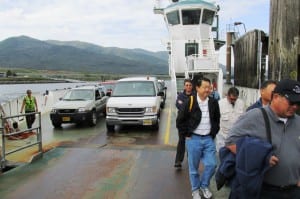The Ketchikan Gateway Borough Assembly adopted an ordinance Monday that will raise various airport fees, including the cost to ride the airport ferry.
Ketchikan International Airport operates at a deficit of about $400,000 a year. The fee increases will cut that deficit approximately in half. Here’s Airport Manager Mike Carney, explaining that the money has to come from somewhere.
“There’s a couple different ways you could do this: A user fee, or pass it on to the taxpayer,” he said.
Carney said user fees charge the people who actually use the airport, and the more someone uses it, the more they’ll pay. The only other option is to ask the State of Alaska for additional subsidies. The state now kicks in about $400,000 a year, which Carney said is about $600,000 less than what the Bethel airport receives.
Ketchikan’s borough operates the state-owned airport through a lease agreement. Carney said that in a few years, Ketchikan will have an option to consider.
“We’ll be at the end of our lease,” he said. “So we’re going to have to make a decision at that time. Right now, we are under a lease and we’re trying to do our best to do our part.”
To close the deficit, numerous fees were looked at, and increased slightly. They include the monthly rate for floatplane stalls, landing fees for airplanes and ferry fees for walk-on passengers and vehicles.
With the Assembly vote, each adult passenger soon will pay $6 instead of $5 to ride the ferry and children will be charged $3 instead of $2. And the cost for vehicles will jump to $7 instead of $6.
There was no public comment in clear opposition to the proposal, although Trevor Shaw, speaking for himself and not as a member of the School Board, suggested that the borough look for ways to cut spending.
Earlier in the day, we asked some airport ferry passengers what they thought of the issue, and they didn’t have a problem with it.
Dr. Ernie Meloche was coming back from dropping some visitors off at the airport, and he said the ferry is worth $6 a ride.
“The service they provide is a superb service an it’s really efficient and they do it well,” he said.
Andy Klimack was taking his wife to the airport, and said he doesn’t particularly like the idea of paying more.
“But, for as many times as I use the airport in a given year, it’s not a meaningful additional cost to me,” he said. “If it’s a way to offset the cost with the operation, I’m fine with paying it.”
There was some talk at the Assembly table of doubling the fee increases in order to take care of the entire deficit all at once. Assembly Member Glen Thompson likened it to “ripping off the Bandaid” rather than allowing any deficit to continue.
Thompson also took issue with the recurring suggestion of giving airport management back to the state.
“This Assembly tends to saber rattle a lot about giving that airport back to the state, but does anyone around this table actually believe that if we gave it back to the state we would have A) as well run airport as we have under Mr. Carney or B) our fees would remain as they are?” he asked. “I can guarantee you the state wouldn’t be arguing about whether or not to raise it halfway or all the way. They’d raise it all the way and then a half to make sure they got out ahead of the game, and then we’d have less service.”
Thompson said he could see some value in an incremental fee increase, though, and would reluctantly support the motion.
It wasn’t a unanimous vote, though. Assembly Members Agnes Moran and Todd Phillips voted no. Phillips said he wants to seriously explore giving the airport back to the state.
“Some things sometimes don’t work, and you gotta say ‘Goodbye,’” he said.
Moran said she would support a solution that solved the entire problem, rather than a partial solution.
The Assembly also approved a measure to place the Forest Park Service Area proposed annexation on the Oct. 7th municipal ballot; and approved a list of prioritized community projects to send to state officials for requested funding.
The Swan Lake expansion project is at the top of the list, which also includes funding for a layup facility at Ward Cove, airport infrastructure, street improvements, the Mahoney Lake hydroelectric project, Saxman Community Center parking lot improvements, shipyard improvements and the Performing Arts Center.
The legislative lobbying executive committee meets Friday to continue the process of establishing project priorities.
The Assembly last night also introduced an ordinance to appropriate $200,000 from the borough cruise ship passenger tax fund to the city’s Hole in the Wall Harbor improvement project; and approved a resolution urging Congress to reauthorize the Secure Rural Schools act.







